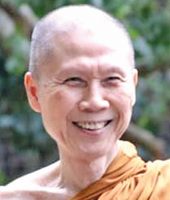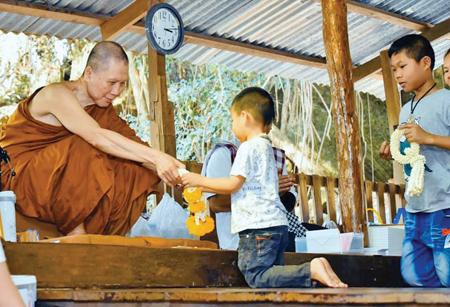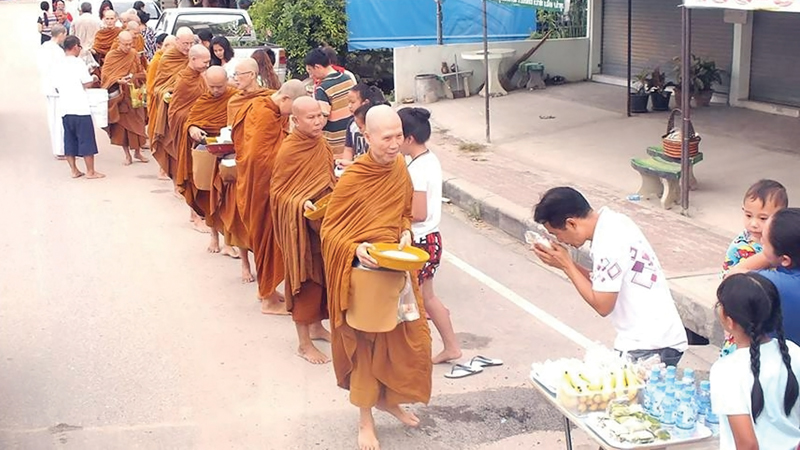Following are excerpts from an interview with Ven. Ajahn Suchart Abhijato Maha Thera of Thailand. The Maha Thera is well known across the globe for his impactful Dhamma teaching methods and meditation practices.

Ajahn Suchart Abhijato Maha Thera
Q: Can the advancement of modern technology influence an individual’s Kamma? For instance, suppose a baby is born with a health condition that prohibits him from leading a normal life which is clearly the result of a bad Kamma he had committed during a previous birth. But thanks to surgical intervention he is fully recovered. Using current technology, he was able to overcome his previous negative Karmic consequences. Could you explain how modern technology/medical innovation can help to mitigate negative Karmic consequences?
A: Well, it is just your interpretation of it. We really do not know whether this modern technology can mitigate the bad Kamma or not.
Anyway, the Buddha said that the workings of the law of Kamma are imponderable to us. So do not worry about it. Do not dwell too much on it because understanding the workings of the law of Kamma exceeds our intellectual capabilities. Just understand it generally- that good Kamma brings good results and bad Kamma brings bad results. But there are some other factors as well that can affect this result. That is all.
Q: Similarly the commonly held view is that the advancement of medicine makes people live longer and better. What is the Buddhist explanation? What is the role of one’s Kamma in this context?
A: Well, some people live longer and better without relying on medical advancements. There is another theory that suggests that one lives longer because his/her mind is purer and moral standards are high. Then your body tends to live longer than that of any immoral person because an immoral person most probably drinks and takes drugs. This affects their body, causing them to perish sooner,
Q: What is the heart and what is the mind? It is our mind that does not die even if the body dies. But the heart just dies with the body. Can we interpret “heart” in a physical context?
A: No, no, it is not the ‘heart’ that is in the body or the heart that pumps the blood. This is not the heart we are talking about. The heart and the mind are the same thing. Sometimes we refer to it separately. The intellectual part of the mind is called the “Mind” or Chitta. If we talk about the emotional part of the mind, we call it the “heart,” It is called ‘Mano’ in Pali. So it is the same thing. It has two aspects though. It has an intellectual part as well as an emotional part.
Q: Yeah, I have often heard people say; “I think from the heart, not the mind.” That explains it all.
A: Yeah, they say so because they are thinking with emotions, love, and compassion. When you think using your ‘mind’, you think rationally and reasonably.
Q: Some people assert that they have reached a higher mental state (such as Sovan, Sakadagami). How can we know if someone has reached this stage or not?
A: You can know this only by following his teachings. If you can achieve the same status (become a Sotapanna or achieve a higher state) by following what he teaches you, then you can be sure that he has become enlightened (reached a higher state.) But if you cannot yet prove it to yourself, neither fully believe nor fully disbelieve. Put it on hold and wait for confirmation first from your practice because we don’t know whether the person is telling the truth or not.
 In Kalama Sutta, the Buddha said; “Do not believe what they (others) say, until you can prove whether it is true or not by yourself.” The only way to prove whether somebody is enlightened or not is to study with them and if you too become enlightened by following their teachings you can pretty much say “Yeah, he must be enlightened or else I will not be enlightened through following his teachings.”
In Kalama Sutta, the Buddha said; “Do not believe what they (others) say, until you can prove whether it is true or not by yourself.” The only way to prove whether somebody is enlightened or not is to study with them and if you too become enlightened by following their teachings you can pretty much say “Yeah, he must be enlightened or else I will not be enlightened through following his teachings.”
The moment you attain enlightenment, as a Sotapanna, you will not doubt the Buddha because it was through his teachings that you were able to achieve enlightenment.
Thus you do not doubt the Buddha, Dhamma, his teachings, or the Sangha, the Noble Disciples because you are yourself a Noble Disciple of the Buddha.
Q: Will a person with a higher state of mind, such as Sovan, Sakkuddagami, or Arhant, ever claim to have acquired such a higher position? What if we asked him directly?
A: Usually an enlightened person does not like to brag about himself. But he will talk about how to achieve enlightenment. This is his teaching. He will not say; “I am a Sotapanna or Sakuddagami or an Arhant.”
But he will tell you; “if you keep following these steps you will achieve a higher state of mind.” He will tell you how to become enlightened. But usually, he would not tell people that he is enlightened.
Q: Is it proper to ask a person if he is an arahant or not?
A: Well, you can ask, but you might not get an answer that you like to hear! You might get an answer like, “go keep practising and find out for yourself.”
There is a rule that prohibits monks from commenting on spiritual achievements that they have not truly accomplished.
This is one of the Four Cardinal Sins (Pārājikas) of a Bhikkhu – to tell he is enlightened when he is not. Such a person could be disrobed.
So it is advisable to avoid asking whether one is enlightened or not because, lying could lead to an accusation of committing one of these Cardinal Sins (Pārājikas).
Q: Many women are keenly interested in Buddhism and diligently follow the path laid out by the Buddha. However, there isn’t a formal Bhikkhuni Order in place. Why do Buddhist countries show relatively little interest in re-establishing the Bhikkhuni Sasana?
 A: People are more attracted to the status than the practice. Because being a Bhikkuni seems to be more respectable, than being an Eight Preceptor or Ten Preceptor. But they forget that the point is not being a Bhikkuni or a Preceptor. The point is being able to practice the Noble Eightfold path.
A: People are more attracted to the status than the practice. Because being a Bhikkuni seems to be more respectable, than being an Eight Preceptor or Ten Preceptor. But they forget that the point is not being a Bhikkuni or a Preceptor. The point is being able to practice the Noble Eightfold path.
Q: What I meant was that there is a well-established Bhikkhu Order in countries such as Sri Lanka. But a Bhikkhuni Order does not exist. I hope it is the same in Thailand. Why cannot we reestablish the Bhikkuni Sasana?
A: In Thailand too it is the same way. We have the same Theravada tradition. And as far as Theravada tradition is concerned, Bhikkunis disappeared a thousand years ago. So you cannot just reestablish it by yourself.
Q: What can we do to revive that Bhikkhuni Order?
A: We cannot do anything. But you can practise as an Eight or Ten preceptor and become enlightened and then you can still be a teacher.
Mae Chee Kaew, one of the female Thai monastics, kept the Eight or Ten Precepts and became enlightened because she studied with great teachers such as Ajahn Mun and Ajahn Maha Boowa.
It does not matter whether you are a Bhikkuni or a Ten or Eight preceptor. It is more important that you practise meditation, develop wisdom and become enlightened. That is the most important thing.
Q: When it comes to animals, their inability to perform good Kamma raises uncertainty about their next birth. For example, since animals such as tigers, lions or even cats rely on hunting for survival, questions arise about whether they accumulate negative Kamma and face difficulty attaining a higher rebirth.
A: That’s right. When they were humans in their previous births and when they used to break the Precepts, they did not know they were doing bad Kamma either. So now they are bearing the consequences of their ignorance.
Q: Is there any way that we can help them to get a good birth by not letting them kill animals? I mean, concerning, domestic animals such as cats?
A: That’s right. You help them by feeding them. So they do not have to go out and kill for their food.
Q: Are they more likely to get a bad birth anyway? What if we feed our cats well and keep them away from hunting as much as possible?
A: If the bad Kamma has not yet expired, he/it might have to be reborn in an animal realm or he may even be born as an animal that does not need to kill (such as a buffalo, elephant, or deer.) They are herbivores and feed only on plants. Eventually, they will be freed from bad Kamma and then they can return to this world as human beings!
Q: So that means it is better to be born as an herbivore than a carnivore?
A: Yeah.
Q: In neuroscience, the relationship between the mind and the brain is discussed. It’s said that having a healthy brain is a prerequisite for having a healthy mind. What viewpoint does Buddhism hold? What is the distinction between the brain and the mind?
A: The brain is just part of the body. It is the physical part. It does not have the ability to think or know anything. So the ‘one that knows’ is called the knowing element or the mind. The mind has two sides to it. It has an emotional side and an intellectual side.
Q: As discussed earlier, the emotional side is also called the heart.?
A: That’s right. Sometimes it is called the ‘heart’ and the intellectual side is called the mind or the Chitta.
Q: In certain cases, diseases are hereditary/genetic, meaning if our parents have a particular condition, we may inherit it. However, as Buddhists, we believe that the diseases we get and our current circumstances are primarily influenced by our past Kamma. Can we still get genetic diseases considering the doctrine that everything is a result of our past Kamma?”
A: Not everything depends on one’s past Kamma. Our past Kamma is one of the factors, not the only factor. There are other factors also that can cause us to have a certain type of body.
So sometimes we can have good Kamma, and but we just happen to be unlucky and get a body from our father or mother who has some genetic defects. So it is not only bad Kamma that determines what type of birth you will get. It could simply be unfortunate for you to get this body.
Q: Could you offer some advice to those who still have difficulty in concentrating their minds during meditation? Sometimes we can stay focused only for 5-10 minutes, but may lose focus thereafter. Could you please advise on how we should proceed?
A: If you lose focus soon, that means your mindfulness is still weak. Your mindfulness is not strong enough. So you need to develop more mindfulness before starting to meditate.
You can develop mindfulness during your daily life – as soon as you get up in the morning, the first thing you should do is mindfulness – start mindfulness as you go and continue with whatever you do such as going to take a shower, brushing your teeth, getting dressed, eating or whatever. Keep focused on your body activity. Do not let your mind wander; go think about other things. Do not go to the office yet, you are not at the office yet. You are still at home. So keep the mind with the body. Then you will develop more mindfulness this way.
Q: Is it okay to start with Metta meditation?
A: No, just use Body meditation – Body mindfulness.
Q: Great. Firstly we should practice mindfulness and then only we can practise deep meditation.
A: That’s right, or else you won’t be able to sit focused for a long time. After you sit for a few minutes your mind may start wandering around, thinking about other things,
But you have to keep the mind focused during meditation. So before you meditate, keep it focused on your body.
Q: What if we can still stay focused only up to 5-10 minutes?
A: See how long you can focus on your body. As you get up tomorrow morning, if you can focus on what your body does from the moment you wake up until you go to work, then you have developed a lot more mindfulness
I guarantee you will be able to sit focused much longer when you meditate. Just be with whatever you do.
Q: Is, just being mindful of the body sufficient to concentrate the mind or stay focused, or do we have to recite the “Buddho, Buddho” mantra as well?
A: You can use both at the same time also. It can reinforce each or you can just use the body mindfulness. But with the mantra, it makes it harder for your mind to wander or think about other things.
Ven. Ajahn Suchart Abhijato Maha Thera was born on November 2, 1947. Having completed his degree in Civil Engineering at California State University, Fresno, USA, he returned to his motherland where he designed an ice cream parlour for a brief stint.
Quite soon, inspired by a Dhamma book, he decided to go in search of “true happiness,” to find inner peace through the practice of Buddhist meditation. He became a bhikkhu at the age of 27 and received ordination at Wat Bovornives in Bangkok on February 19, 1975, with Somdet Phra Ñanasarivara, the late Supreme Patriarch (Somdet Phra Sangharaja), as his preceptor.
Ven. Ajahn Suchart Abhijato Maha Thera resides in Wat Yansangwararam, Thailand.








